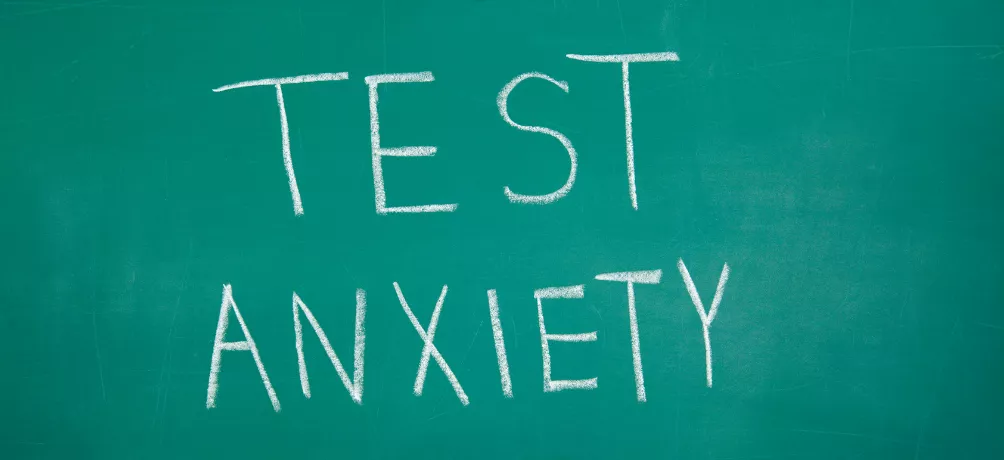Understanding and Managing Test Anxiety
By Dr. Mary Rooney, Ph.D.
Virtually all students experience some degree of anxiety when they are preparing for or taking a test. In fact, a moderate amount of anxiety can sharpen our ability to think and can improve test performance. But when anxiety becomes excessive, the opposite happens – panic sets in and we have difficulty remembering things we knew just a few minutes ago. Test anxiety can happen to anyone, but it’s much more common in students with ADHD, a learning difference, or an anxiety or mood disorder.
Test anxiety is actually a form of performance anxiety. It’s similar to the anxiety that someone might experience when they’re giving a speech or performing onstage. In the case of test anxiety, the symptoms occur when someone is preparing to take a test and is worried about their ability to perform well. These worries are part of the four symptom clusters that characterize test anxiety:
- Emotional symptoms: excessive worry about performance, feeling helpless, negative self-talk
- Behavioral symptoms: difficulty sitting still, fidgeting, trouble sleeping
- Physical symptoms: increased heart rate, upset stomach, shallow or rapid breathing, muscle tension
- Cognitive symptoms: difficulty concentrating, racing thoughts, mind going blank or difficulty recalling information
There are many different factors that contribute to test anxiety. These can include catastrophic thinking (e.g. “If I fail this test, I’ll never graduate.”) or perfectionistic tendencies, poor performance on past tests, a lack of test preparation (e.g. cramming, poor study habits), and a lack of self-confidence. In the case of students with ADHD or learning differences, poor working memory is also a contributing (and often overlooked) factor.
Working memory is the ability to hold information in our mind, work with it in some way, and then recall the information when it’s needed. ADHD, some learning differences, and anxiety are all associated with lower working memory capabilities. When anxiety is at its peak, working memory abilities are even more impaired, causing a student to feel as though their mind has gone blank or like they can only recall the most basic information related to the test topic.
Test anxiety can feel overwhelming, and it can cause students to feel powerless and hopeless. Fortunately, with the proper tools and support, test anxiety can be managed very effectively. Students with test anxiety, and especially those who also have ADHD or a learning difference, will need support from a therapist, school counselor, or learning specialist to learn new emotional, cognitive, and academic skills and strategies.
The counselor or therapist should help the student learn study skills that emphasize breaking down big tasks into smaller chunks that are spread out over time, teach strategies (drawn from cognitive behavioral therapy) for noticing and challenging self-defeating thoughts and worries, help practice relaxation and mindfulness techniques for reducing the physical symptoms of test anxiety, and encourage healthy sleep and eating habits.
Test anxiety is a very real problem for many kids and teens with ADHD or learning differences, and it’s not likely to get better on its own. If you think your child is struggling with test anxiety, reach out to a school counselor, therapist, or learning specialist for help. With the right support, your child’s test anxiety will go down over time and their test scores will go up in the process!
ABOUT DR. MARY ROONEY
Mary Rooney, Ph.D., is a licensed clinical psychologist in the Department of Psychiatry at the University of California San Francisco. Dr Rooney is a researcher and clinician specializing in the evaluation and treatment of ADHD and co-occurring behavioral, anxiety, and mood disorders. A strong advocate for those with attention and behavior problems, Dr. Rooney is committed to developing and providing comprehensive, cutting edge treatments tailored to meet the unique needs of each child and adolescent. Dr. Rooney's clinical interventions and research avenues emphasize working closely with parents and teachers to create supportive, structured home and school environments that enable children and adolescents to reach their full potential. In addition, Dr. Rooney serves as a consultant and ADHD expert to Huntington Learning Centers.
ABOUT HUNTINGTON
Huntington Learning Center is the tutoring and test prep leader. Its certified tutors provide individualized instruction in reading, phonics, writing, study skills, elementary and middle school math, Algebra through Calculus, Chemistry, and other sciences. It preps for the SAT and ACT, as well as state and standardized exams. Huntington programs develop the skills, confidence, and motivation to help students of all levels succeed and meet the needs of Common Core State Standards. Founded in 1977, Huntington's mission is to give every student the best education possible. Call us today at 1.800.CAN LEARN to discuss how Huntington can help your child. For franchise opportunities please visit www.huntingtonfranchise.com.
This website does not provide medical advice, diagnosis, or treatment. The material on this site is provided for educational purposes only.


